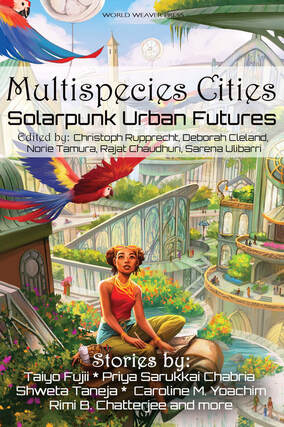 Guest Blog by Phoebe Wagner In my short story “Children of Asphalt,” I used first person plural—“we”—as the point of view. This POV can be rather tricky as it includes the reader in that plural “we,” asking the reader to essentially join that community. Readers in the US will probably have read or heard of William Faulkner’s “A Rose for Emily,” which is about a town grappling with the behaviors of a resident. This point of view is ideal for certain story structures, particularly ones that focus on an “other,” such as a stranger coming to town. I love trying less typical points of view, structures, plots, etc. in my writing, but so often, those stories end up being trunked because it becomes more about the technique and less about the characters. I struggle to find an atypical technique that speaks to the story, so I was excited when the voice of the community in “Children of Asphalt” came to me so clear. I’ve written pieces of solarpunk flash fiction in a similar first person plural POV because the group voice better encompasses a difference in narrative that I believe most solarpunk must strive for. Rather than individual responses to the climate crisis, I hope writers consider how communities respond instead. The climatic hero’s journey will not be the plot of surviving or adapting to climate change. One way to start changing the structure is to reconsider how writers create stories. For me, that was the POV. Even though it’s a community POV, I made the choice for there to be a difference in age, just as there might be with the reader. The “we” is the adults of the community, and the story would be entirely different if I’d chosen to write from the “we” of the children. I’m not sure I could write that story right now. The children of such a time will think so differently than I do that I wasn’t sure I could embody those ideas on the page in the short amount of space that I had. As the solarpunk genre continues to grow—and indeed, it does seem to be growing—I hope the writers consider the how of the story and not just the why. The climate crisis will become a narrative in the news, in history, and in art. In the US, with a focus on the singular hero so strongly embedded in white US literary heritage, solarpunk writers must consider how the shape and voice of a story can shift the focus from hero to community. Phoebe Wagner holds an MFA in Creative Writing and Environment and currently pursues her PhD in literature at University of Nevada, Reno. Her recent fiction can be read in Diabolical Plots, Cosmic Roots and Eldritch Shores and AURELIA LEO. In 2017, Upper Rubber Boot Books published her co-edited anthology Sunvault: Stories of Solarpunk & Eco-Speculation, and she’s under contract to co-edit another solarpunk book from West Virginia University Press. Currently, she blogs about speculative literature at the Hugo-finalist Nerds of a Feather, Flock Together and can be found online at phoebe-wagner.com.
0 Comments
Your comment will be posted after it is approved.
Leave a Reply. |
World Weaver PressPublishing fantasy, paranormal, and science fiction. Archives
February 2024
|
- Home
-
Books
-
All Books
>
- Beyond the Glass Slipper
- Bite Somebody
- Bite Somebody Else
- Black Pearl Dreaming
- Cassandra Complex
- Causality Loop
- Clockwork, Curses, and Coal
- Continuum
- Corvidae
- Cursed: Wickedly Fun Stories
- Dream Eater
- Equus
- Fae
- Falling of the Moon
- Far Orbit
- Far Orbit Apogee
- Fractured Days
- Frozen Fairy Tales
- Glass and Gardens: Solarpunk Summers
- Glass and Gardens: Solarpunk Winters
- Grandmother Paradox
- Grimm, Grit, and Gasoline
- Haunted Housewives
- Heir to the Lamp
- He Sees You When He's Creepin': Tales of Krampus
- Into the Moonless Night
- Jack Jetstark's Intergalactic Freakshow
- King of Ash and Bones (ebook)
- Krampusnacht
- Last Dream of Her Mortal Soul
- Meddlers of Moonshine
- Mothers of Enchantment
- Mrs Claus
- Multispecies Cities
- Murder in the Generative Kitchen
- Recognize Fascism
- Scarecrow
- Sirens
- Shards of History
- Shattered Fates
- Skull and Pestle
- Solarpunk (Translation)
- Solarpunk Creatures
- Solomon's Bell
- SonofaWitch!
- Speculative Story Bites
- Trenchcoats, Towers, and Trolls
- Weredog Whisperer
- Wolves and Witches
- Anthologies and Collections
- Novels
- Novellas
- Fairy Tale
- Fantasy
- Romance
- Science Fiction
- Urban/Contemporary Fantasy
- Young Adult SFF
-
All Books
>
- Blog
- About
- Contact
- Press / Publicity
- Newsletter Signup
- Privacy Policy
- Store

 RSS Feed
RSS Feed